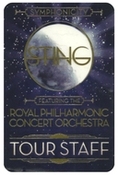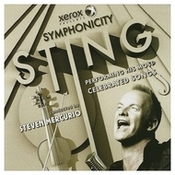
Sting and the Royal Philharmonic Orchestra at the Xcel...
Sting brought the biggest, and clearly the most accomplished, backing band of his storied career along with him to the Xcel Energy Centre in St. Paul on Monday night, with England's Royal Philharmonic Concert Orchestra sitting in with the venerable singer, who completely reworked his material with 10 different arrangers expressly for his 'Symphonicity' Tour tour. The 45-piece Orchestra added a depth and elegance to songs that already had plenty of emotion, while breathing new life into Sting's classic material as well as his more recent hits. The RPCO, whom Sting claimed he ''borrowed from the Queen,'' were dynamic and superb all evening long, lead by the steady and excitable hand of Maestro Steven Mercurio, who clearly enjoyed bringing a classical bent to the celebrated pop staples of Sting. But in the end, no matter how much his songs were dressed up in orchestral pomp and finery, the night truly belonged to Sting's pure dulcet voice and his illustrious songbook filled with memorable and instantly recognizable numbers.
The 26-song performance was split evenly into two 70-minute sets, and while the first set was clearly the better of the two, the show ended so strongly that you can forgive everyone for the sluggish start to the second set. I can say that Sting brought out the big guns early in his performance, but the man simply has so many hits that the night ended up being chock-full of them throughout. 'If I Ever Lose My Faith In You' kicked the show off strongly, followed by a triumvirate of songs that any songwriter would kill to have in their canon: 'Englishman In New York', 'Every Little Thing She Does Is Magic', and 'Roxanne', which was given a sultry, Latin-flavoured tempo, and also featured Sting on acoustic guitar. Sting proved to be chatty and affable all night, introducing the tender ballad 'When We Dance' by explaining: ''In my humble experience, there are two kinds of love songs. The 'I love you and you love me' variety, which are boring and don't really go anywhere. And then there's the 'I love you and you love someone else,' songs, which are far more interesting. Painful, but interesting.''
He also talked about a friend of his in New York in the '80s who was able to steal the satellite feed of Russian television stations, so the two of them would get drunk and watch Russian children's programs late into the evening. When Sting saw how much care went into those programs, he realized that Russians love their kids as well, despite what the Cold War had taught him. So that experience obviously inspired him to write 'Russians', which was given an eerie, Hitchcockian intro by the orchestra, and was clearly one of the night's standouts. He also told a touching story about his father, who encouraged Sting ''when you finish school, go to sea,'' which he took to mean go live a life filled with adventure. He joked that he really let his dad down by becoming a musician, but after he died, Sting wrote 'Why Should I Cry For You?' for his father, which is poignantly filled with touching imagery of the sea as well as his dad. It is a song already bursting at the seams with deep feeling, and the RPCO only added to its emotional weight during this stunning performance.
The 13-song first set closed triumphantly with a rollicking version of 'Next To You', before Sting announced they would be taking a 20-minute break. That break unfortunately killed a bit of the momentum built up during the first set. Sting took the opportunity to dig deeper into his catalogue during the second set, playing more obscure and less recognizable numbers, even donning a vampiric, Victorian frock coat to sing the haunting 'Moon Over Bourbon Street'. And while the orchestra continually kept things vibrant, much of the mood and splendour of the earlier part of the show was lost during the plodding start of the second set.
?The night featured many well-know artists creating lovely visual accompaniments to Sting's music, which were projected on three massive screens that continually moved above the stage. The stirring artistic work augmented the set brilliantly (much like Jonsi's recent shows at the Pantages). Antoine Catala created paintings reminiscent of Francis Bacon which magnified the feeling of the rousing 'King Of Pain', while Mat Collishaw's arrestingly fluid artwork coloured 'Shape Of My Heart', and Takeshi Murata's colourful, mesmerizing work fit perfectly with set closer 'Fragile'. They were all carefully crafted visual elements that beautifully added to the overall experience of the performance.
The second set snapped out of its doldrums with a spirited version of 'Mad About You', which really kick-started the stellar close to the show. The aforementioned 'King Of Pain', featuring electric guitar work from Dominic Miller, kept things in high gear, flowing smoothly into main set closer 'Every Breath You Take', which found Sting in great voice, as he was throughout the evening. The band came back out for two separate encores, delivering impassioned versions of 'Desert Rose', 'She's Too Good For Me', and 'Fragile', before which Sting came out with an iPod trying to sing along to 'Free Bird', which some idiot twice called out for. (Note to everyone not already aware: that ''joke'' is now so old that it just makes you look stupid when you say it, especially with the distinguished RPCO in the building. Please stop. No exceptions.)
The crowd kept roaring, so Sting came back out and sang a brief a cappella version of 'I Was Brought To My Senses' that finished the night serenely. Sting's music, no matter how familiar with it you were going into the show, was given a fresh, sophisticated restyling by the Royal Philharmonic Concert Orchestra, and their involvement subsequently gave new life to Sting, who was clearly pleased to discover these songs anew along with his adoring audience.
(c) Minneapolis City Pages by Erik Thompson
Sting brought the biggest, and clearly the most accomplished, backing band of his storied career along with him to the Xcel Energy Centre in St. Paul on Monday night, with England's Royal Philharmonic Concert Orchestra sitting in with the venerable singer, who completely reworked his material with 10 different arrangers expressly for his 'Symphonicity' Tour tour. The 45-piece Orchestra added a depth and elegance to songs that already had plenty of emotion, while breathing new life into Sting's classic material as well as his more recent hits. The RPCO, whom Sting claimed he ''borrowed from the Queen,'' were dynamic and superb all evening long, lead by the steady and excitable hand of Maestro Steven Mercurio, who clearly enjoyed bringing a classical bent to the celebrated pop staples of Sting. But in the end, no matter how much his songs were dressed up in orchestral pomp and finery, the night truly belonged to Sting's pure dulcet voice and his illustrious songbook filled with memorable and instantly recognizable numbers.
The 26-song performance was split evenly into two 70-minute sets, and while the first set was clearly the better of the two, the show ended so strongly that you can forgive everyone for the sluggish start to the second set. I can say that Sting brought out the big guns early in his performance, but the man simply has so many hits that the night ended up being chock-full of them throughout. 'If I Ever Lose My Faith In You' kicked the show off strongly, followed by a triumvirate of songs that any songwriter would kill to have in their canon: 'Englishman In New York', 'Every Little Thing She Does Is Magic', and 'Roxanne', which was given a sultry, Latin-flavoured tempo, and also featured Sting on acoustic guitar. Sting proved to be chatty and affable all night, introducing the tender ballad 'When We Dance' by explaining: ''In my humble experience, there are two kinds of love songs. The 'I love you and you love me' variety, which are boring and don't really go anywhere. And then there's the 'I love you and you love someone else,' songs, which are far more interesting. Painful, but interesting.''
He also talked about a friend of his in New York in the '80s who was able to steal the satellite feed of Russian television stations, so the two of them would get drunk and watch Russian children's programs late into the evening. When Sting saw how much care went into those programs, he realized that Russians love their kids as well, despite what the Cold War had taught him. So that experience obviously inspired him to write 'Russians', which was given an eerie, Hitchcockian intro by the orchestra, and was clearly one of the night's standouts. He also told a touching story about his father, who encouraged Sting ''when you finish school, go to sea,'' which he took to mean go live a life filled with adventure. He joked that he really let his dad down by becoming a musician, but after he died, Sting wrote 'Why Should I Cry For You?' for his father, which is poignantly filled with touching imagery of the sea as well as his dad. It is a song already bursting at the seams with deep feeling, and the RPCO only added to its emotional weight during this stunning performance.
The 13-song first set closed triumphantly with a rollicking version of 'Next To You', before Sting announced they would be taking a 20-minute break. That break unfortunately killed a bit of the momentum built up during the first set. Sting took the opportunity to dig deeper into his catalogue during the second set, playing more obscure and less recognizable numbers, even donning a vampiric, Victorian frock coat to sing the haunting 'Moon Over Bourbon Street'. And while the orchestra continually kept things vibrant, much of the mood and splendour of the earlier part of the show was lost during the plodding start of the second set.
?The night featured many well-know artists creating lovely visual accompaniments to Sting's music, which were projected on three massive screens that continually moved above the stage. The stirring artistic work augmented the set brilliantly (much like Jonsi's recent shows at the Pantages). Antoine Catala created paintings reminiscent of Francis Bacon which magnified the feeling of the rousing 'King Of Pain', while Mat Collishaw's arrestingly fluid artwork coloured 'Shape Of My Heart', and Takeshi Murata's colourful, mesmerizing work fit perfectly with set closer 'Fragile'. They were all carefully crafted visual elements that beautifully added to the overall experience of the performance.
The second set snapped out of its doldrums with a spirited version of 'Mad About You', which really kick-started the stellar close to the show. The aforementioned 'King Of Pain', featuring electric guitar work from Dominic Miller, kept things in high gear, flowing smoothly into main set closer 'Every Breath You Take', which found Sting in great voice, as he was throughout the evening. The band came back out for two separate encores, delivering impassioned versions of 'Desert Rose', 'She's Too Good For Me', and 'Fragile', before which Sting came out with an iPod trying to sing along to 'Free Bird', which some idiot twice called out for. (Note to everyone not already aware: that ''joke'' is now so old that it just makes you look stupid when you say it, especially with the distinguished RPCO in the building. Please stop. No exceptions.)
The crowd kept roaring, so Sting came back out and sang a brief a cappella version of 'I Was Brought To My Senses' that finished the night serenely. Sting's music, no matter how familiar with it you were going into the show, was given a fresh, sophisticated restyling by the Royal Philharmonic Concert Orchestra, and their involvement subsequently gave new life to Sting, who was clearly pleased to discover these songs anew along with his adoring audience.
(c) Minneapolis City Pages by Erik Thompson
June 21, 2010
SET LIST
- If I Ever Lose My Faith In You
- Englishman In New York
- Every Little Thing She Does Is Magic
- Roxanne
- Straight To My Heart
- When We Dance
- Russians
- I Hung My Head
- Shape Of My Heart
- Why Should I Cry For You?
- Whenever I Say Your Name
- Fields Of Gold
- Next To You
- A Thousand Years
- Tomorrow We'll See
- Moon Over Bourbon Street
- End Of The Game
- You Will Be My Ain True Love
- All Would Envy
- Mad About You
- King Of Pain
- Every Breath You Take
- Desert Rose
- She's Too Good For Me
- Fragile
- I Was Brought To My Senses




